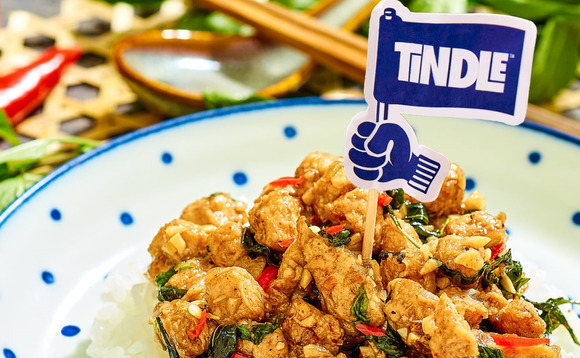
Deal focus: Faux fowl fast-forwards

Next Gen Foods is pushing hard to popularise its meatless chicken brand Tindle in the name of climate action. The largest-ever Series A round in alternative protein is jumpstarting the campaign
Like many alternative protein makers, Singapore's Next Gen Foods positions itself as a cleantech company, noting that its meatless chicken requires 82% less water, 74% less land, and creates 88% less greenhouse gas emissions than the real thing. The name of its flagship product, Tindle, is a reference to 19th-century physicist John Tyndall, who first demonstrated the role of carbon dioxide in global warming.
However, Next Gen is a standout among branded customer-facing players in this space in terms of basing its entire business model on a climate-focused mission statement.
First, chicken was chosen as the target because it allowed for maximum global impact; it is the most commonly eaten meat in the world and found in centre-of-plate dishes across every culture and religion. Global beef is a juicier market in dollar terms, but chicken reaches more people.
Second, time is of the essence. Tindle will be perfected on the fly, with restaurant feedback driving research into new product iterations as a breakneck expansion continues. In only 20 months, the brand has penetrated Singapore, Hong Kong, the Middle East, Europe, and the US.
"Everything we do is built around the realisation that we probably have 10 years to be able to combat climate change," Next Gen CFO Rohit Bhattacharya said.
"We don't have the luxury of time to be too slow changing the world. Therefore, everything in the company has been built with blitz-scaling in mind. We need to be able to be as ubiquitous as chicken in a very short time window."
Temasek connection
Bhattacharya introduced Next Gen's co-founders Andre Menezes and Timo Recker to each other in 2019. At the time, Bhattacharya had been with Temasek Holdings for about 10 years, latterly supporting its food tech program. Temasek was an early backer of industry leaders such as Impossible Foods, Memphis Meats, and Just Egg.
Recker, a German native whose family business made schnitzel for three generations, was raising funds for his company LikeMeat. Menezes, a Brazilian-born poultry exporter, was general manager of Temasek portfolio company Country Foods and overseeing distribution of Impossible in Singapore. After the two set up Next Gen in 2020, Bhattacharya was brought on board.
Temasek has naturally been a strong guiding hand since the beginning and in a rare move led a USD 30m seed round for the company last year. This was said to be the largest-ever seed investment in a vegetarian meat start-up.
Last month, Temasek helped repeat the trick, supporting a USD 100m investment that has been called the largest-ever Series A round in the category. GGV Capital, Alpha JWC Ventures, EDBI, K3 Ventures, and China's Bits x Bites also participated, as did Paul McCartney's MPL Ventures. It valued Next Gen at USD 700m, according to a source close to the situation.
Part of the plan is to continue working on Tindle at a new innovation centre Temasek is building at Singapore's biomedical sciences hub Biopolis. Next Gen will have a private R&D suite at the facility.
The more immediate agenda is in the US, where a beachhead has been established at several trendy restaurants and a nationwide rollout will be supported by DOT Foods, the country's largest food distributor.
Taking a page from Impossible's playbook, Next Gen is attempting to make a good first impression on meat eaters by following a "chef-first" market entry model. The idea is to start with "mass premium" restaurants and gradually move into fast food where good partnerships can be leveraged.
Brand awareness
Much attention will be paid to keeping up a premium image. To encourage creative usage, Tindle is shipped to restaurants in oblong, mouldable chunks rather than burgers, tenders, or nuggets.
There is no rush to end up on competitive grocery store shelves and in the hands of amateur cooks. "We want to avoid brand dilutive sales," Bhattacharya said.
Next Gen's environmental goals depend on the success of Tindle as a brand and its strategy for balancing on the intellectual property (IP) tightrope that all food tech companies must walk. A simple ingredients list is required for positioning a product as a healthy alternative – but going too natural leaves the IP exposed to copycats.
Tindle's gambit is a nine-ingredient recipe of mostly water, soy, and coconut oil, plus one tech-based outlier called Lipi, a proprietary mix of sunflower oil and natural flavourings said to reproduce the taste of chicken fat.
"When you put in novel ingredients and genetically modified ingredients, it's easier to create an X factor on taste, but regulators are against it and you can't access large tranches of global consumption, be it Europe, be it China," Bhattacharya said. "Ultimately, if you only have 10 years to fight climate change, spending six to get a regulatory approval is just not the right way to go about it."
Latest News
Asian GPs slow implementation of ESG policies - survey
Asia-based private equity firms are assigning more dedicated resources to environment, social, and governance (ESG) programmes, but policy changes have slowed in the past 12 months, in part due to concerns raised internally and by LPs, according to a...
Singapore fintech start-up LXA gets $10m seed round
New Enterprise Associates (NEA) has led a USD 10m seed round for Singapore’s LXA, a financial technology start-up launched by a former Asia senior executive at The Blackstone Group.
India's InCred announces $60m round, claims unicorn status
Indian non-bank lender InCred Financial Services said it has received INR 5bn (USD 60m) at a valuation of at least USD 1bn from unnamed investors including “a global private equity fund.”
Insight leads $50m round for Australia's Roller
Insight Partners has led a USD 50m round for Australia’s Roller, a venue management software provider specializing in family fun parks.







